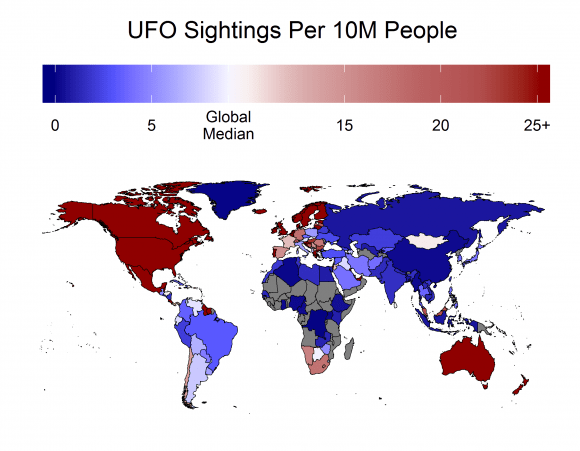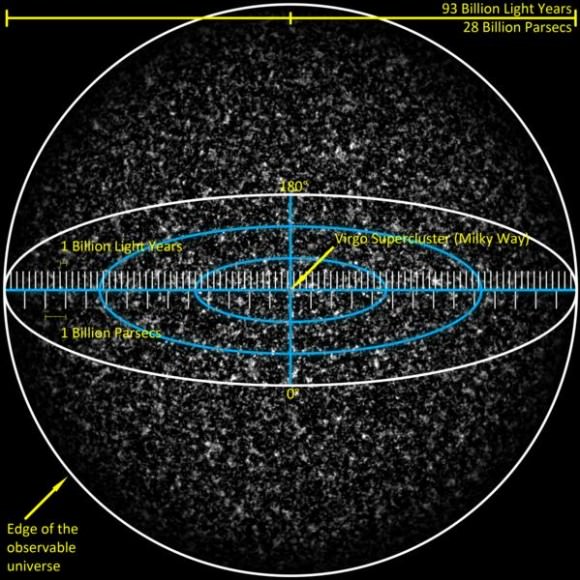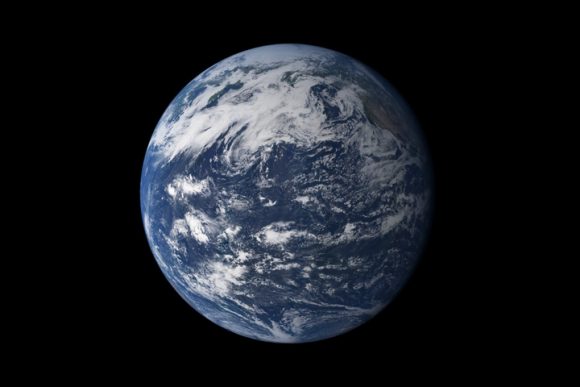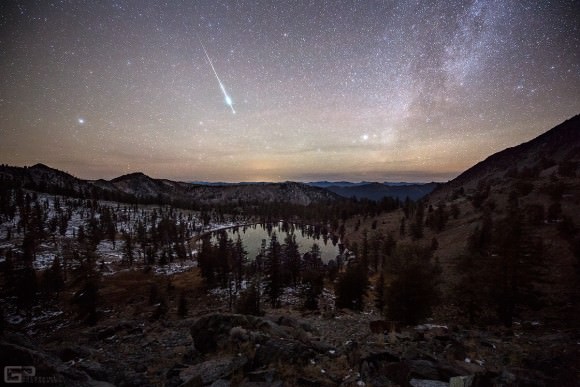Whenever I do a new livestream on Instagram (hint hint, @universetoday on Instagram), it's generally with an audience that doesn't have a lot of experience with my work here on Universe Today or YouTube.
They're enthusiastic about space, but they haven't been exposed to a lot of the modern ideas about astrobiology and the search for extraterrestrials. They have, however, seen a lot of TV and movies.
And so, the most common question I get, by a long shot is, "do you believe in aliens?"
That's actually a more complicated question. On the one hand, the question could be: do I believe that aliens are visiting Earth, creating crop circles, infiltrating our government, and experimenting on human/alien hybrids for the eventual overthrow of human civilization?
The answer to that question, is no.

Capturing a Bright Fireball, breaking up with debris. Yellow Springs, Ohio. Photo credit: John Chumack
I believe in UFOs, in that, I believe there are unidentified objects flying in the air, which haven't gotten a definitive categorization. And when they do get an explanation, it's weather balloons, or Venus, or airplanes, or fireworks, or drones, or a hoax.
It's never aliens.
Because if it was aliens, we would have some kind of evidence. There would be something, anything, that gave definitive proof that aliens were here.
What I'm talking about is some kind of monument, or machine, or vehicle, or factory. Something that's been around here on Earth for as long as human history, and has no explanation for how it could have been created.
UFO researchers point to things like the pyramids, or the statues on Easter Island, or the Nazca lines, when there's plenty of evidence these things could be created by humans and their tools of the age. Even when the hoaxers who created crop circles with a plank on a rope and a little planning tried to explain how they did it, people didn't really believe them.
I want to show you a series of amazing visualizations created by Sam Monfort, a data researcher in the Human Factors and Applied Cognition program at George Mason University. Sam pulled in data from the National UFO Reporting Center or NUFORC which has been collecting reports all the way back to 1905.
Since its inception, NUFORC has received almost 105,000 UFO reports. And sighting are at an all time high.

Reported UFO sightings per decade. Credit: Sam Monfort
But what's really fascinating is how the trends of what people see have changed over time. A century ago, the vast majority of UFOs were spheres or cigar shaped. But then saucers showed up in the 20s, and that's all anyone saw.

Types of UFOs reported per decade. Credit: Sam Monfort
Cigars have dropped down to almost nothing, while lights in the sky have grown in prominence to become almost 50% of the UFOs that people see these days.
Clearly spaceship design took a turn away from cigars, to saucers to glowing lights. Oh, fickle aliens spacecraft designers, following the latest fashions.
The timing is interesting too. There's a rise in sightings around July 4th in the US every year. Fireworks maybe?

Reported UFO sightings in July peak on the 4th. Credit: Sam Monfort
The other piece of data that's pretty interesting is that people in the US are 300 times more likely to report a UFO sighting than any other country in the world. My own Canada is number 2.

The distribution by country of reported UFO sightings. Credit: Sam Monfort
Here's the thing. A huge percentage of the population is now carrying around their own personal tricorder, which will record audio, video and take amazing pictures, even in a dimly lit alien spaceship. And yet, there still hasn't been any definitive, scientifically proven evidence for aliens.
Google is watching everywhere I go, and reminds me that I visited Home Depot last week, but you think the occasional trip to an orbital research facility would get picked up.
I feel pretty confident when I say, there's no evidence that aliens are visiting Earth.
But the deeper question is a little more unsettling. Do I believe there are aliens in the Universe?

The observable - or inferrable universe. This may just be a small component of the whole ball game.
The Universe is huge. The very edge of the Universe we can see is known as the observable Universe. The first light in the Universe has been traveling through space for 13.8 billion years to reach our eyes. And because of the expansion of the Universe, those regions are now more than 46 billion light years away from us.
That's just the observable Universe. The actual physical Universe is much larger. Hundreds of billions, trillions, quadrillions or more light years across. Maybe it's even infinite.
Forever is a long way.
And we know that the Universe is old. It's been around for 13.8 billion years. Our Milky Way has been around for almost that entire period. The Solar System showed up a relatively recent 4.5 billion years ago. We're late to a party that's been raging for almost 10 billion years already.
Fossil evidence tells us that life formed here on Earth pretty much as quickly as it was possible to do so. Just a few hundred million years after the Earth formed, and it wasn't entirely a ball of molten rock, life popped up and started evolving.

Hematite tubes from the hydrothermal vent deposits that represent the oldest microfossils and evidence for life on Earth. The remains are at least 3.7 billion years old. Credit: Matthew Dodd/UCL
Multiply the Universe's age by its size and you get a place that really should be teeming with life, and yet we don't see any evidence of aliens. Not in cigars nor saucers.
This is of course, the Fermi Paradox, and we've talked about this several times in the past. We can't seem to find evidence of aliens, or their robotic spacecraft which should be busily colonizing the Milky Way turning every planet they reach into more robots.
The Fermi Paradox has been the source of arguments and existential terror for many.
In fact, if the Fermi Paradox doesn't bother you in an existential way, then I don't think you've thought about the Fermi Paradox enough.
Are there aliens? There might be single-celled, simple organisms across the Universe. But more complex animals like we have here on Earth might be incredibly uncommon.

Earth, seen from space, above the Pacific Ocean. Credit: NASA
This is the idea of the Rare Earth hypothesis, which was put forward in the year 2000 in a book by paleontologist Peter Ward and astrobiologist Donald Brownlee. If you have any interest in this subject, I highly recommend you give it a read.
In Rare Earth, Ward and Brownlee argue that Earth was lucky in many factors that we never really thought about before.
The Earth is the right distance from the center of the Milky Way so we're not bombarded by radiation, but not too far so that we're in the outskirts, with no heavy elements.
We orbit the right kind of star, and the right configuration of other planets in the Solar System. No big bully super-Jupiters that caused havoc with our planet or kicked us out of the Solar System entirely.
The orbit of the Earth has been stable for a long time, following a roughly circular orbit around the Sun. Our planet is the right size and density for life to survive and thrive. With plate tectonics, which help recycle our rocks and atmospheric gasses, so we don't become a hellworld like Venus.
With a single large Moon that helped regulate our tides and provided an environment where some lifeforms could have been forced to find a better way.
And then some kind of secret sauce that helped give Earth life the kick it needed to go from simple to complex lifeforms.
Maybe there's life everywhere, but we'll never find anything more complex than bacteria. Or maybe we'll never find anything anywhere. Ever.

A bright Taurid meteor falls over Deadfall Basin, near the base of Mount Eddy in California. Credit and copyright: Brad Goldpaint.
I understand why the search for UFOs is so fascinating for people, and why many think that's a reasonable default answer for seeing glowing lights in the sky. But for me, I want to know for sure that we're not alone, that there are other aliens lifeforms and maybe even civilizations out there among the stars.
I don't believe UFOs are aliens, and I'm not entirely convinced there's anyone else in the entire Universe.
And that's why I think we should dedicate ourselves to finding out the answer. Listen to stars for signals from extraterrestrial civilizations, search planets for the chemical signatures of alien life. Scour our own Solar System for anything. Under the rocks on Mars or under the oceans of Europa.
If it does turn out that we're alone? What then? Do we have a greater responsibility to take care of ourselves and our planet, to make sure the candlelight of life and intelligence doesn't flicker out?
Now you know how I feel about aliens, what about you? Do you think we're being visited on a regular basis? Do you think there are aliens out there, somewhere, waiting to be discovered? Or do you think we're all alone in the Universe. I'd like to know your thoughts.
In our next episode, we're going to talk about one of the biggest current mysteries in astronomy: Fast Radio Bursts. They were only recently discovered, and they're a total mystery. No answers next time, only questions.
What would we do if aliens actually visited us here on Earth? How prepared are our governments to deal with them? It turns out, there are some specific plans and preparations, and I detail them in this video.
No comments:
Post a Comment